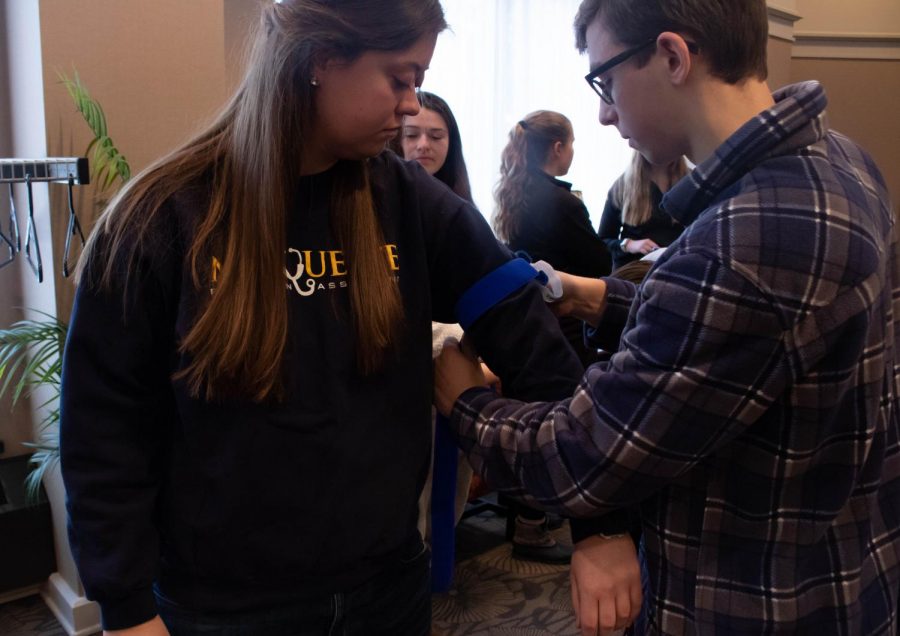Stop the Bleed training events took place Saturday at the Alumni Memorial Union to teach students how to prevent deaths that result from bleeding out.
There were four training sessions throughout the day, taught from 11 a.m. to 4 p.m. During these sessions, students were given a presentation and then were able to practice what they learned.
Stop the Bleed is a national organization educating people on how to prevent blood loss related deaths through training and supply kits. The organization was created by the American College of Surgeons, the Committee on Trauma, the Committee on Tactical Combat Casualty Care and the National Association of Emergency Medical Technicians.
Stop the Bleed’s mission statement is to “provide resources that enable collaboration and cooperation between the many people and organizations working to train and equip the nation to reduce the loss of life due to traumatic bleeding.”
During the presentation, students were taught how to recognize life-threatening blood injuries and understand the procedures when in a trauma-intensive scenario.
Students practiced applying a tourniquet, a device that stops blood flow. Tourniquets can be used to prevent bleeding out in an arm or leg. They were also able to practice packing a wound, which is when someone puts cloth or gauze into the wound and applies continuous direct pressure. According to the presentation given by Jean Fisher, capstone adviser and clinical assistant professor at Marquette’s PA program, packing a wound is what one should do if a tourniquet is not available, or if the wound is in a place where a tourniquet would be inefficient.
Michael Druck, a senior in the College of Health Sciences, was able to practice putting a tourniquet on himself and on others during the training.
“It’s a great opportunity to respond in life-threatening emergencies and to experience some of these things firsthand,” Druck said. “It puts it into perspective and makes you realize you can make a difference.”
Fisher said accidents and injuries are the fourth leading cause of death in America. In cases of trauma, bleeding out is the second leading cause.
Professional third-year physician assistant students Maddie Emlaw and Ashley Beaudry heard about Stop the Bleed at the annual conference for the Wisconsin Academy of Physician Assistants.
“We thought (Stop the Bleed) would be a really cool project (to bring to Marquette),” Beaudry said. “We had talked about all the popularity mass casualty events are getting in the media.”
Beaudry said she thought it was important that civilians know how to stop bleeding because in many cases of mass casualty, people die waiting for emergency responders. Two million people worldwide die from blood loss every year, according to a 2018 review by the New England Journal of Medicine. One point million deaths per year are a result of physical trauma.
Emlaw and Beaudry have their capstone project approaching for the physician assistant program. They can do writing based on research, or do something active in the community, Emlaw said.
“We both really liked the idea of being able to do something and leaving something for the university to continue,” Emlaw said.
Jean Fischer, Emlaw and Beaudry’s capstone adviser and clinical assistant professor at Marquette’s PA program, said she thought it would be a good idea to bring Stop the Bleed to Wisconsin.
“The only thing more tragic than a death is a preventable death,” Beaudry said.

